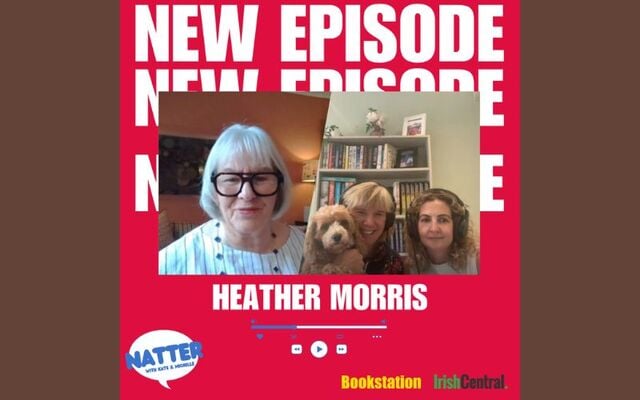Author of global bestseller "The Tattooist of Auschwitz", Heather Morris has been telling stories all her life, but it wasn’t until later in life that it occurred to her to "write the buggers down". However, the New Zealand-born social worker doesn’t think her late parents would be too surprised at the incredible turn her career has taken since the publication of her stunning debut in 2018.
“A couple of years back, I was sitting with two of my brothers and we were talking about what our parents would have thought of the fact that I was having this success writing. And I said, they would never have considered that I would be doing this. And they went, well, yes and no. And then they reminded me, ‘you were always the family bullshit artist’. I was always telling stories just not writing them down.”
Heather was chatting with writers Kate Durrant and Michelle McDonagh on their chart-topping Irish books podcast Natter with Kate and Michelle, produced in association with Bookstation, Ireland’s fastest-growing and best-value bookseller, and IrishCentral, your daily source for all things Irish.
Her route to worldwide success is the stuff of every wannabe writer’s dreams, with the "Tattooist" trilogy selling more than 18 million copies worldwide. However, the seed of that dream was sown one day, way back in 2003, when Heather was working in a large public hospital in Melbourne and was introduced to an elderly gentleman "who might just have a story worth telling." The man was Lale Sokolov and over the next three years he was to share a story of survival, resilience and hope, that changed both their lives.
Her latest book "The Wish", a heartbreaking contemporary novel of a dying teenager’s final wish, a lonely young man’s journey towards connection and the unexpected friendship they find together, was also inspired by real people, and one child in particular, who Heather met in the course of her work in the hospital.
Read more
“I’ve had this story sitting in the bottom of my drawer for probably 25 years. I wrote it back then as a screenplay. The story is centred around teenagers because I and everyone who works in the area of children with terminal illnesses sees the difference in those kids. You’ve got the younger kids, the under-five-year-olds who have no comprehension, and even up to about 11 or 12, they still don’t really comprehend what’s happening and what’s going to happen. But then you see this wisdom and maturity in those very early teenagers and that's what I wanted to capture in this story.”
The isolated loner in her new book, Alex was inspired by a young man who came into the hospital one day to drop off Nintendo games to a child patient. Heather instructed him to give the games to the patient himself and from that initial contact, a beautiful relationship blossomed between the young man, and the patient and their family. In the real-life version of the story, the young man had been a street kid who couldn’t remember any of his family and who had saved himself from a life of drugs by hanging out in game arcades and managed to get a job in the gaming industry.
“Jessie is told that she can make a wish and for you and I and probably every other healthy person in the world, if you get asked, do you want to make a wish, how excited are you going to be? Isn't that the dream? But for the parents (of these kids), it is the worst thing they can ever hear. They don't want to hear those words.”
Writing the stories of those who bring them to her is not a task Heather takes lightly. At one point during her many hours listening to Lale’s tale, one of severe trauma, suffering and loss as well as love and beauty, she asked a psychiatrist colleague if it was possible that she could be doing him harm because she would stop immediately if she thought she was.
“And he (my colleague) was brilliant. His first words to me were, he will never tell you something he doesn't want you to know. Draw a line under that. Okay. Done. And for me to always remember that was so important.”
To those who might make accusations of cultural appropriation or suggest that a writer does not have the right to write about something outside their own cultural experience, Heather is very black and white. She points out that she is "a fiction writer, not a historian".
“Lale hadn't told me his story for me to then not subsequently tell you and so many other readers around the world. Then it would not have been told because he didn't have the capacity to tell it himself or write it himself… I've never made any claim to having lived or been part of his story. I've become his storyteller and I have no issue with that. And with the academics and the historians, I say, thank you, thank you. There is, of course, a place for you in this world and always will be. But guys, you've got to accept that there's a place for folks like me too that are telling these stories at a more personal level.”
"The Wish" by Heather Morris was published in the US, UK, and Ireland on Thursday, September 11, 2025, in paperback, ebook, and audiobook.
Listen to Heather’s interview on Natter with Kate and Michelle now Acast or on Spotify, Apple or wherever you get your podcasts. Make sure to follow us on Instagram @natterthepod or Facebook. You can purchase "The Wish" at BookStation.ie here.




Comments